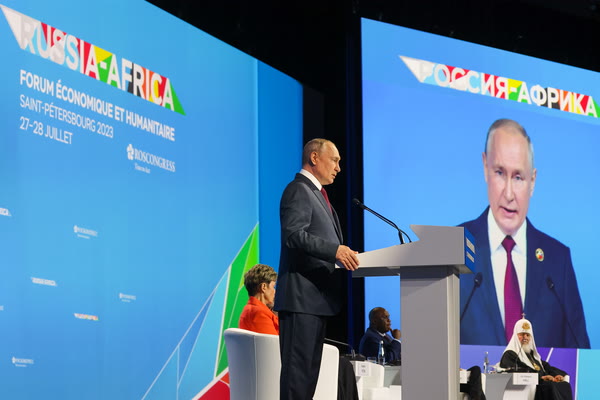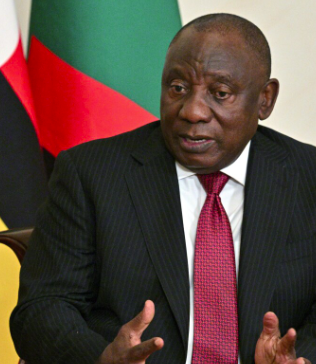The Second Russia-Africa Economic and Humanitarian Forum in St Petersburg is allowing Russia to further position itself as a natural ally to the Global South, strengthening the political dialogue between Russia and African nations – at a crucial moment when the world is searching for peace and solidarity across continents. So far, the meeting seems to be doing just that.

Freddie Ponton
21st Century Wire
As NATO member states are still scratching their heads over ‘what when wrong with the Ukraine counter-offensive’, and question Putin’s motivations for exiting the infamous Grain Deal brokered between Russia, Ukraine, United Nations and Turkey guaranteeing the safety of ships carrying Ukrainian grain, fertilizer and other foodstuffs through a humanitarian corridor in the Black Sea – the unaffected Russian President Vladimir Putin is hosting the Russia-Africa Economic and Humanitarian Forum’s plenary session in St Petersburg.
Make no mistake, this is a ground-breaking conference.
The Kremlin confirmed this week that the a number of key trade and development deals are already in the works, thanks to the event’s well-crafted plenary session which brought to the stage some of the most distinguished guests from the Russia-Africa Economic and Humanitarian Forum including Chairperson of the African Union and President of the Union of the Comoros Azali Assoumani, Patriarch Kirill of Moscow and All Russia, President and Chairman of the Board of Directors of the African Export–Import Bank Benedict Oramah, as well as the President of the New Development Bank Dilma Rousseff and the President of Uganda H.E. Kaguta Museveni, just to name a few.
Director of the Russian Academy of Sciences Institute for African Studies Irina Abramova moderated the discussion.
The forum’s main topic was “Technology and Security in the Name of Sovereign Development for the Benefit of Humankind.”
President Putin took part in the plenary session of the Economic and Humanitarian Forum as part of the Russia-Africa 2023 summit in St. Petersburg. Watch:
From the get-go, many knew this summit would bring not only interesting discussions around topics such as political cooperation, security cooperation, trade and economic cooperation, legal cooperation, scientific, technical, humanitarian and information cooperation, as well as work in environmental protection, but also agreements and commitments towards common goals and interests, working towards a comprehensive declaration and a Russia-Africa Partnership Action Plan by 2026.
Many anticipated the Russian straightforwardness and Putin’s appetite for building on the very successful 2019 Russia-Africa Summit in Sochi in Russia, and thus far they are not disappointed.
President Vladimir Putin started the “Second Russia-Africa Summit” with a big bang, announcing during his opening remark that Russia will send between 25,000 and 50,000 tons of grain to six African countries free of charge in the next four months, Russia also offering to cover the transportation costs. Beneficiaries will include Burkina Faso, Zimbabwe, Mali, Somalia, Central African Republic and Eritrea.
Is this the behaviour of someone whose intention is to starve the world, like the leading G7 western countries would have you believe? I think not, and the numbers speak for themselves, with Russia having already exported some 10 million tons of grain to the African continent in the first six months of the year 2023, compared to the 2022 figure which stood at 11.5 million tons for the whole year.
SEE ALSO: Putin Makes ‘Africa Sovereignty’ Pledge to Leaders
Although the United Nation’s Joint Coordination Centre would have you believe that 57% of the foodstuffs exported from Ukraine over the past year went to developing countries and 43% to developed countries as outlined in this BBC article, the reality is in fact rather different as Russia outlined in its economic report which shows 32.8 million tonnes of grain that left Ukraine over the past year, but more than 70% of that went to rich countries, namely the EU, where much of it was resold for profit by commodity middlemen traders.
 Furthermore, many questions were raised during the recent African Peace Mission when South African President Ramaphosa (image, left) and leaders from Egypt, Senegal, Zambia and the Comoros, all of whom met with both Ukrainian President Volodymyr Zelensky and Putin, in a bid to help negotiate an end to the war. Some of the points made during these meetings dealt with the shortage of grains, fertiliser and energy supply said Russian Ambassador to South Africa Ilya Rogachev.
Furthermore, many questions were raised during the recent African Peace Mission when South African President Ramaphosa (image, left) and leaders from Egypt, Senegal, Zambia and the Comoros, all of whom met with both Ukrainian President Volodymyr Zelensky and Putin, in a bid to help negotiate an end to the war. Some of the points made during these meetings dealt with the shortage of grains, fertiliser and energy supply said Russian Ambassador to South Africa Ilya Rogachev.
It is clear now that the second “Russia-Africa Summit” in St Petersburg is bringing some of the answers to these questions.
Here are some of the key points from Vladimir Putin’s statements at the plenary session of the Russia-Africa Economic and Humanitarian Forum which can help us better understand why Putin left the grain deal but also how Russia intend to become a major long-term ally of African countries.
◾ Russian-African trade turnover totalled $18 billion, this is the result of the Sochi Summit;
◾ Africa’s potential is clear to all, with GDP growth in the continent’s countries exceeding the global average;
◾ More than half of Russian supplies to Africa are machinery and equipment, chemicals and foodstuffs;
◾ Trade in agro-industrial products between Russia and Africa grew by 10% last year, and by 60% since the beginning of this year;
◾ Russia has already exported 10 million tonnes of grain to Africa in the first six months of this year;
◾ Western countries are blocking grain and fertiliser supplies while hypocritically blaming Russia for the global food crisis;
◾ In one year of grain trade, 32.8 million tonnes of cargo left Ukraine, with more than 70% going to rich countries;
◾ Less than 1 million tonnes of cargo under the grain deal went to the poorest countries in Africa;
◾ None of the Russian Federation’s conditions under the grain deal have been met;
◾ The way to help the poorest countries under the grain deal would be to lift restrictions on Russian grain and fertiliser exports;
◾ Of the 260,000 tonnes of fertiliser blocked in Europe, Russia has only managed to send two small consignments to Malawi and Kenya;
◾ Russia is ready to send free grain to needy African countries in the face of expected bumper harvests;
◾ It is Russia that is making a significant contribution to global food security;
◾ Russia is ready to send 25-50 thousand tonnes of grain free of charge to Eritrea, Burkina Faso, Somalia and Zimbabwe in the next four months;
◾ Telling untruths has been the practice of a number of Western countries in recent decades and centuries;
◾ Africa can not only feed itself in the future, but also become a food exporter, and the Russian Federation will support it in this endeavour;
◾ Russia is ready to help Africa introduce the most advanced technologies in agriculture;
◾ Putin announced the preparation of about 30 energy projects with the participation of the Russian Federation in Africa;
◾ The total capacity of the energy projects being developed in 16 African countries is about 3.7 gigawatts;
◾ Russia’s oil and gas exports to Africa have increased 2.6 times;
◾ The Russian Federation can provide Africa with non-energy peaceful nuclear technologies, including in medicine, which have no analogues in the world;
◾ Russia hopes to open an industrial zone near the Suez Canal in Egypt in the near future;
◾ Putin expects that products manufactured in Russia’s industrial zone near the Suez Canal will be exported to all African countries;
◾ It is important to vigorously switch to national currencies, including the ruble, in transactions;
◾ Russia is ready to develop Africa’s financial infrastructure, including its connection to the Russian payment system;
◾ The North-South transport corridor will make it possible to establish convenient deliveries of goods to and from Africa;
◾ Russia is interested in cooperation with all integration structures in Africa, such as the EAEU and the African Union Free Trade Area;
◾ Russia is ready to share its integration experience with Africa through the Union State of Russia and Belarus;
◾ The Russian Federation is ready to expand the network of Russian trade missions in Africa;
◾ Putin proposed to increase the number of attachés and specialists in Africa, as well as intergovernmental commissions.
If I had to sum up the contents of this summit so far, I would use words such as sovereignty, freedom, partnership and hope.
In his speech, Putin laid out a bold vision which would make Africa a major food exporter to the world, and accelerate their economic development in ways never seen before, and pledged Russia’s assistance to make that happen.
Putin: Africa can not only feed itself, but also become a food exporter, and Russia will help in this. The Russian Federation is ready to share its expertise with African countries, the President noted. He said that yesterday he had already discussed with African colleagues the… pic.twitter.com/qq4ewE3c3A
— 🅰pocalypsis 🅰pocalypseos 🇷🇺 🇨🇳 🅉 (@apocalypseos) July 27, 2023
It’s already evident that these discussions will lead to the empowerment of individuals, in particular young people and women of Africa – who are the driving force behind structural economic transformation and industrialisation on the continent.
Let us hope these positive developments in mutual cooperation in St. Petersburg spread back into the West, and even help in some way to resolve the protracted conflict in Ukraine.
Listen to Freddie Ponton’s commentary on the African Summit on TNT Radio earlier this week:
READ MORE BRICS NEWS AT: 21st Century Wire BRICS Files
SUPPORT OUR INDEPENDENT MEDIA PLATFORM – BECOME A MEMBER @21WIRE.TV
















